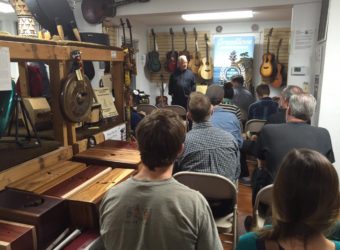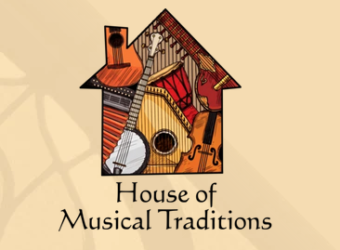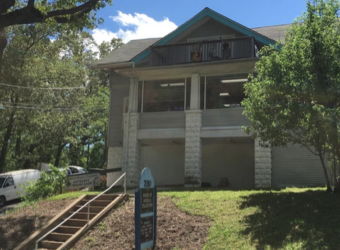 Wherever Dave Eisner, the owner of House of Musical Traditions in Takoma Park, MD, goes, music follows. It’s been that way his entire life, whether he liked it or not.
Wherever Dave Eisner, the owner of House of Musical Traditions in Takoma Park, MD, goes, music follows. It’s been that way his entire life, whether he liked it or not.
As a child growing up in West Orange, New Jersey, he was often surrounded by the musician friends of his father, who had a dual career as a dentist in New York City and as a first chair violinist in the New Jersey Symphony.
“He truly loved the instrument and probably would have rather have been, you know, a full-time professional musician, but growing up Jewish in New York city with a Jewish mother and father, they’re like, no, you’ll be a doctor. You’ll be a dentist. You know?,” said Eisner. “But for me, it made me very, very comfortable around music and musicians because every time I turned around, there was a quartet in the living room or something.”
Still, Eisner himself, never picked up an instrument, and was instead more involved in competitive swimming, which eventually guaranteed his admission to the University of Maryland in 1966. Without really trying, he found himself yet again around music and musicians during his time as a student.
“I had joined a fraternity, which were at the time, were actually not bad things. Especially if you were an out of state kid and you didn’t really know anybody. And they said, Hey, you know the job for student advisor’s available. I said, well, what’s that? You got to plan all the parties. So as a freshman, I became the student advisor of this fraternity, which meant I had to deal with bands and hire bands for parties.”
As he fulfilled the duties as student advisor to the administrators who planned Homecoming and Spring Weekend for University of Maryland, he helped produce shows featuring Sly and the Family Stone, Paul Butterfield Blues Band, Aretha Franklin, and more. And, by his junior year, he found his school schedule was also comprised of electives that got him even more enthused about non-western music.
“So I was taking African history, Asian history, and then keeping it music oriented. I could kind of lean into the different forms there. I could study the blues by taking courses like that. So all of this just kept leading to more and more music,” said Eisner.
Eisner graduated with a BA in psychology and a minor in creative writing in 1970, and made plans to attend graduate school in American Studies. Meanwhile, he was also getting into lap dulcimers—so much so, he sought out the dulcimer builder in Greenwich Village named Hank Levin, who ran the business along with his wife Lynn.
“I go up there and he says, uh, yeah, I’m building them, but you know, it’s funny you’re here because we’re going to be moving to California,” said Eisner. “I said,’ Oh, what are you going to do with the store?’”
Shortly thereafter, Eisner bought the store, and its name—House of Musical Traditions—from Levin for $1500. A little while later, Eisner moved the store from Greenwich Village to Takoma Park, Maryland. Now, it’s one of the most beloved and oldest businesses in town—and for good reason. House of Musical Tradition specializes in making western instruments, like Breedlove acoustic guitars, and rarer non-western musical instruments, like tabla drums, accessible.
“You know, it occurred to me like if you wanted to buy a sitar, you had to go to an Indian restaurant, hope that the sitar player, if he was working that night spoke enough English. So you could get across to him that you wanted to buy one of his instruments. And then if you wanted to buy a doumbek, you know, you go to a belly dance show and no, no, I’m not here to see the dancers. I want to talk to the guy in back was playing the drum, you know,” said Eisner. “So, there was no central place really to find the instruments under one roof. I thought, we can do better than this.”
And do better, Eisner has. Through the store, and other Eisner’s other efforts like his non-profit The Institute of Musical Traditions (IMT), and his radio show “Musical Traditions Encounter” on Takoma’s WOWD, Eisner preserves and promotes American and international folk music traditions and helps to nurture new forms to evolving from these cultural roots. It’s all the result of deep passion for learning about and sharing music.
“My employees are just, you know, they were amazing because they get it, you know, they understand how important music is. I take their opinions very seriously as to product selection,” Eisner said. “They understand how to pervade the love of music and the effect that has on people. And I know that sounds like a cliché, but it keeps repeating itself year after year, decade after decade here.”



